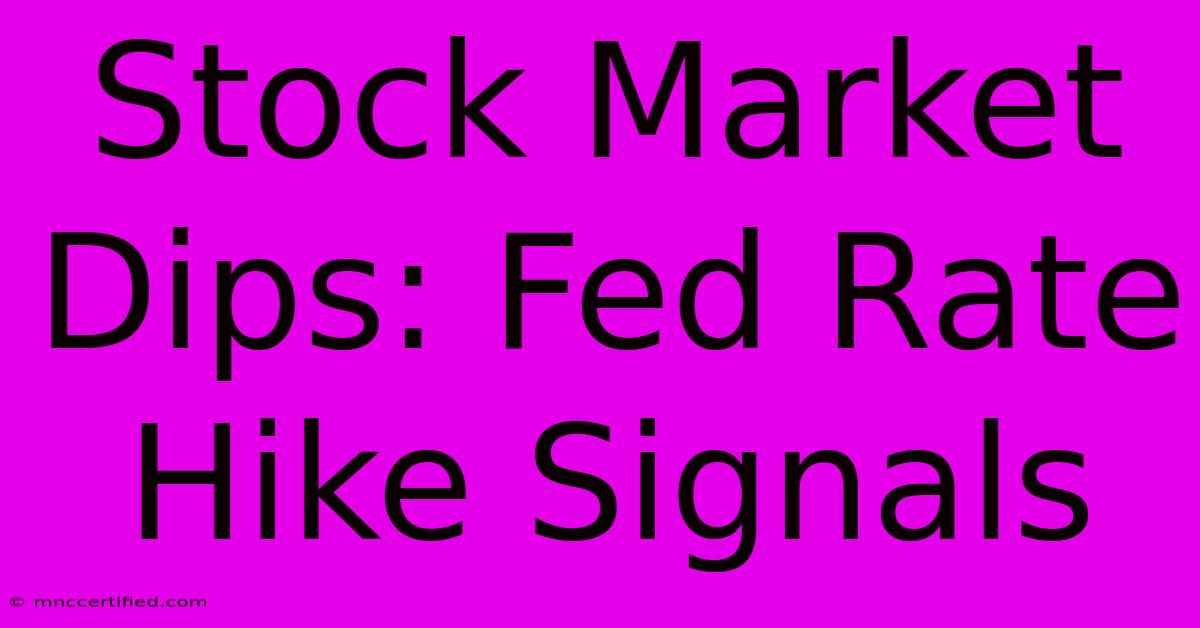Stock Market Dips: Fed Rate Hike Signals

Table of Contents
Stock Market Dips: Decoding the Signals from Fed Rate Hikes
The stock market's intricate dance with the Federal Reserve (Fed) is a complex relationship, often marked by volatility. When the Fed raises interest rates, it's a significant event that can send ripples—sometimes waves—through the financial world. Understanding these signals is crucial for investors navigating the market's ups and downs. This article delves into the connection between Fed rate hikes and stock market dips, helping you understand the underlying mechanisms and how to potentially mitigate risk.
Why Do Fed Rate Hikes Often Lead to Stock Market Dips?
The Fed's primary tool for controlling inflation is adjusting interest rates. A rate hike makes borrowing more expensive for businesses and consumers. This can lead to several factors impacting the stock market:
-
Higher borrowing costs for businesses: Companies rely on loans for expansion, acquisitions, and everyday operations. Increased interest rates translate to higher debt servicing costs, potentially reducing profitability and slowing growth. This can negatively impact company valuations and stock prices.
-
Reduced consumer spending: Higher interest rates also affect consumers. Mortgages, auto loans, and credit card debt become more expensive, leading to reduced discretionary spending. This decrease in consumer demand can hurt company revenues and profits, further impacting stock prices.
-
Increased bond yields: Bonds become more attractive investments when interest rates rise, offering higher returns. This can lead to investors shifting their portfolios from stocks to bonds, reducing demand for stocks and consequently depressing prices. This is often referred to as a flight to safety.
-
Stronger dollar: Higher interest rates in the US can strengthen the dollar relative to other currencies. This makes US exports more expensive and imports cheaper, potentially hurting US companies with significant international operations.
Understanding the Market's Reaction: Short-Term Volatility vs. Long-Term Trends
It's important to differentiate between short-term market reactions and long-term trends. While a Fed rate hike might initially cause a stock market dip, the long-term impact depends on various factors, including:
-
The magnitude of the rate hike: A small, incremental increase might have a less dramatic impact than a large, unexpected hike.
-
Market expectations: If the market anticipates a rate hike, the impact might be less severe than if the increase is a surprise. Market sentiment plays a significant role.
-
The overall economic health: A strong economy can better absorb the impact of higher interest rates than a weakening one.
-
Corporate earnings: Strong corporate earnings can offset the negative impact of higher interest rates, potentially supporting stock prices.
How to Navigate Market Volatility During Fed Rate Hikes
Navigating market volatility during periods of Fed rate hikes requires a strategic approach:
-
Diversify your portfolio: Don't put all your eggs in one basket. Diversification across different asset classes (stocks, bonds, real estate, etc.) can help mitigate risk.
-
Re-evaluate your risk tolerance: Higher interest rates often mean a more volatile market. Assess your risk tolerance and adjust your investment strategy accordingly. Consider consulting a financial advisor for personalized guidance.
-
Long-term perspective: It's crucial to maintain a long-term investment horizon. Short-term market fluctuations are normal, and focusing on long-term growth can help weather the storms.
-
Stay informed: Keep up-to-date on economic news, Fed announcements, and market trends. This will help you make informed investment decisions.
Conclusion: Preparing for the Next Rate Hike
Fed rate hikes are a regular part of the economic cycle. Understanding their impact on the stock market is crucial for investors. By understanding the underlying mechanisms, diversifying your portfolio, and maintaining a long-term perspective, you can better navigate the volatility and potentially capitalize on opportunities presented by these market adjustments. Remember, professional financial advice is always recommended for personalized investment strategies. Staying informed and adapting your strategy is key to successful investing in a dynamic market environment.

Thank you for visiting our website wich cover about Stock Market Dips: Fed Rate Hike Signals. We hope the information provided has been useful to you. Feel free to contact us if you have any questions or need further assistance. See you next time and dont miss to bookmark.
Featured Posts
-
Herschel Walker Bahamas Ambassador
Dec 19, 2024
-
Water Outage Impacts 58 000 In Southampton
Dec 19, 2024
-
Trump Bahamas Ambassador Pick Walker
Dec 19, 2024
-
Wildfire Emergency California Evacuations
Dec 19, 2024
-
Trinity Rodman On Dennis Rodman
Dec 19, 2024